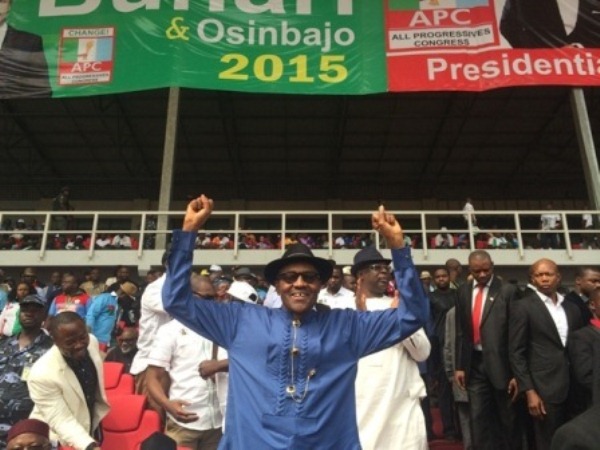Nigerians had to forgive former military ruler Muhammadu Buhari many sins for him to win this weekend’s election.
“The General”, as his supporters now affectionately call him, kicked out an elected government in 1983, ushering in an era of military dictatorship in Africa’s most populous nation that was to last 15 years.
During his 18 months in charge, he imprisoned journalists and opposition activists without trial, executed drug traffickers by firing squad and ordered soldiers to thrash those who failed to queue in an orderly fashion at bus stops.
Fittingly, perhaps, he was himself deposed in another military coup.
“His rule was nasty, brutish and mercifully short,” the Economist magazine wrote in a column last month, describing the 72-year-old as less “awful” than incumbent Goodluck Jonathan, whose years in office have been plagued by corruption scandals.
Ladi Netimah, a senior civil servant condemned to 65 years in prison by Buhari’s junta for “doing business while in government”, has since forgiven the general.
She served nearly four years of her sentence and describes him as someone who “wanted things done properly but went about it in the wrong way”.
“He was too heavy handed,” she told Reuters.
But over the ensuing years, Buhari reinvented himself as a democrat, and his four attempts to take power peacefully demonstrated a commitment to the ballot box if nothing else.
With many Nigerians upset at Jonathan’s performance, especially over their two biggest bugbears, corruption and security, more and more were prepared to overlook Buhari’s past, and its cobwebs of military austerity and authoritarianism.
“Jonathan made it easy for Buhari by disappointing so many people,” popular Blogger Tolu Ogunlesi told Reuters. “It was a case of ‘Jonathan has to go and I will vote for anything else’.”
“TOO YOUNG TO REMEMBER”
The son of a canoe maker and the first president since the 1999 restoration of democracy never to have worn an army uniform, Jonathan started his first term with much good will in his favour.
But it was quickly eroded, as he failed to face up to an Islamist insurgency in the northeast and corruption flourished.
His administration was beset by multibillion dollar graft scandals in the oil business. When central bank governor Lamido Sanusi complained that up to $20 billion was unaccounted for at the state oil firm, Jonathan simply sacked him.
A perceived failure to take the Islamist Boko Haram insurgency seriously at first did not bother many Nigerians as most were not directly affected.
But when the militants kidnapped more than 200 school girls from the town of Chibok last April, provoking global outrage, his administration’s plodding response triggered protests that ultimately played a part his downfall.
By contrast, Buhari’s short rule in the 1980s earned him a reputation as strongman with no time for corruption or rebellion, both of which he squashed.
His image as an ascetic wearing a simple kaftan and spurning the champagne-fuelled lifestyle enjoyed by much of Nigeria’s elite, added to his appeal.
But demographics may also have been a deciding factor.
“More than two thirds of the population is under 40 and too young to remember Buhari,” said Max Siollun, author of “Soldiers of Fortune”, a history of post-colonial Nigeria.
More remarkable is the willingness of those mistreated or imprisoned by “The General” to give him another chance.
In January veteran journalist Tunde Thompson, jailed for eight months by Buhari’s junta under the Orwellian-sounding “Decree 4”, said he had forgiven him and that Buhari was someone “who can help bring discipline through democratic means”.
Similarly Netimah, who before her secret military trial spent three weeks in a concrete cell with no toilet and nothing to sleep on but a chair, said she bore no grudges.
When she met her tormentor-in-chief years later, the pair simply laughed about the curious twists of Nigeria’s turbulent history.
“I think he was just passionate about Nigeria,” she said.

